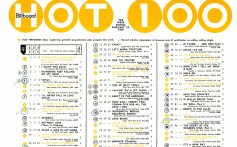Business
Page: 25
Trending on Billboard
MUSEXPO has announced Kirk Sommer, senior partner and global co-head of music at WME, as the recipient of the 2026 “International Music Person of the Year” Award. The honor will be presented during MUSEXPO’s 26th global edition at its annual awards luncheon on Tuesday, March 24, 2026, at Castaway in Burbank, Calif.
The prestigious award recognizes Sommer’s profound global influence and artist-first leadership within the music industry. Across his nearly 25-year tenure at WME, Sommer has earned a reputation for integrity, mentorship, and visionary representation — guiding the live careers of some of the most celebrated artists of the modern era. His roster spans genres and generations, including Adele, Billie Eilish, The Killers, Andrea Bocelli, Hozier, Arctic Monkeys, Sam Smith, Steve Aoki, Benson Boone, Lewis Capaldi, Nine Inch Nails, Foster the People, and Weezer, among others. Sommer also worked closely with the late Amy Winehouse, a testament to his long-standing commitment to nurturing emerging talent into global icons.
Related
In his current role as global co-head of music, Sommer helps steer WME’s worldwide strategy across touring, festivals, and live entertainment. His artist-first approach has earned him wide respect from peers and clients alike, shaping the careers of artists from their first club shows to sold-out arena and stadium tours.
Sommer’s accolades reflect his influence across the business. In 2025, he was named Pollstar’s “Agent of the Year” and inducted into New York University’s Hall of Fame. He’s been a mainstay on Billboard’s Power 100 for more than a decade, and has also appeared on Variety’s Top 500, Pollstar’s Impact 50, and PAPER magazine’s list of the most influential booking agents in the world.
Beyond his professional impact, Sommer and his family are dedicated supporters of causes focused on mental health, children’s welfare, and healthcare access.
Trending on Billboard
Disgraced hip-hop mogul Sean “Diddy” Combs was transferred to the federal correctional institution at Fort Dix, N.J. to serve out his 50-month sentence. The New York Times reported that a spokeswoman for the Bureau of Prisons confirmed on Thursday (Oct. 30) that 55-year-old Combs will be housed at FCI Fort Dix following his sentencing earlier this month to four years and two months in prison for two counts of transportation to engage in prostitution.
Explore
See latest videos, charts and news
Following his Oct. 3 sentencing, Combs’ lawyers asked judge Arun Subramanian to recommend that the Bureau of Prisons send their client to Fort Dix, “in order to address drug abuse issues and to maximize family visitation and rehabilitative efforts.”
Combs, who will get credit for time served in detention at the Metropolitan Detention Center (M.D.C.) in Brooklyn since his arrest in Sept. 2024, should be eligible for release in May 2028. During the eight-week trial, prosecutors called two of Combs’ former girlfriends to the stand to describe their participation in marathon, drug-fueled “freak-off” sex parties with hired male prostitutes. In July, the jury in the case acquitted Combs of the more serious charges of sex trafficking and racketeering conspiracy.
As he begins his time at Fort Dix, Combs’ lawyers are attempting to expedite his criminal appeal, arguing that he could be close to the end of his sentence by the time his case is heard if forced to follow the typical, drawn-out argument timeline. Combs’ team is challenging both his July conviction and the resulting four-year prison sentence in the case.
In the Second Circuit Court of Appeals where Combs’ case will be heard, it can take nearly a year and a half on average to get a criminal appeal decided and his lawyers don’t want to wait that long. In a court filing on Tuesday (Oct. 29) they said Combs could complete most of his sentence during the appeal timeline. Combs has already gotten credit for time spent in jail since his arrest and could have his sentence further reduced for good behavior or participation in a drug abuse rehab program.
ABC News reported that Combs’ legal team requested the Fort Dix facility because it offers a special drug treatment program that, if he completes it successfully, could take time off his sentence. ABC quoted sources saying that Combs is not being housed in the prison’s general population, but in the special drug program unit.
In filings from Combs’ team before his sentencing, they said that during his time at M.D.C. their client was sober for the first time in 25 years and that he had been leading an informal six-week business and entrepreneurship education program for other inmates he called “Free Game with Diddy.”
While rumors of a potential pardon from Donald Trump have been floated in the press, on Oct. 21 the White House Communications Office threw cold water on a TMZ report that had quoted a “high-ranking White House official” saying that the president was considering commuting Combs’ sentence soon. “There is zero truth to the TMZ report, which we would’ve gladly explained had they reached out before running their fake news,” the White House spokesperson said.
Just days after Diddy’s sentencing, Trump confirmed that the producer’s legal team had officially requested a presidential pardon. “A lot of people have asked me for pardons,” the president said at the time. “I call him Puff Daddy. He has asked me for a pardon.”
Trending on Billboard
Dan Rosen has been promoted to an expanded role at Warner Music Group, now overseeing both the Australasia and Southeast Asia markets in a strategic move that consolidates leadership across a region of more than 550 million people.
Rosen, who currently serves as president of Warner Music Australasia, will now also lead recorded music operations in Indonesia, Malaysia, the Philippines, Singapore, Thailand and Vietnam. He continues to report to Lo Ting-Fai (Lofai), president of Warner Music Asia-Pacific.
Related
Under the new unified structure, Rosen will guide teams across eight diverse markets, with Warner Music citing the region’s heavy engagement with digital platforms and its increasing global influence. Southeast Asia is considered a “trigger region” by major labels — where digital momentum can break songs globally. WMG notes that some of its biggest acts receive up to a third of their global streams from this region alone.
“This region is richly diverse, full of extraordinary artists, talented entrepreneurs, and young passionate fans, who are highly engaged with a booming music ecosystem,” said Lofai. “Under Dan’s skilled leadership, our artists will tap into both the economic value and weight of population across all eight countries, providing a powerful springboard to global fame and fortune.”
The company also confirmed that Warner Music Australasia is evolving its domestic artist structure to double down on developing local acts. Recent global breakthroughs under Rosen’s leadership include Balu Brigada, Budjerah, Boy Soda, Kita Alexander and Thelma Plum.
“Our mission has always been to find dynamic ways to help our local artists go global, and for our global artists to grow passionate local fanbases,” Rosen said. “I’m honoured to lead a talented, focused team, and work with our amazing local partners, in these six diverse and exciting markets in Southeast Asia, while reinforcing our commitment to Australian and NZ artists.”
As part of Warner’s growing Southeast Asian presence, the company recently launched a pan-regional campaign for Vietnamese indie artist Vũ, who is set to embark on the largest-ever Australian tour by a Vietnamese artist.
Rosen will continue to lead Warner Chappell Music in Australia and New Zealand. Publishing operations in Southeast Asia remain under Arica Ng, president of Warner Chappell Music APAC, who reports to Guy Moot, co-chair and CEO of Warner Chappell Music.
Trending on Billboard
Universal Music Group (UMG) reported solid growth across all three business units on Thursday (Oct. 30), with revenue rising 10.2% in constant currency to 3.02 billion euros ($3.53 billion). Early shipments of Taylor Swift’s The Life of a Showgirl, which had an Oct. 3 street date, helped UMG’s physical sales jump 23% year over year. But the quarter was dominated by subscription gains and strong publishing results. During Thursday’s conference call, the conversation was heavy on AI and UMG’s new partnership with the generative AI platform Udio.
Here are some main takeaways from UMG’s third-quarter results and executives’ comments during Thursday’s conference call.
Related
UMG Announced a Renewed Licensing Deal with YouTube
Usually, a major announcement regarding a leading streaming platform gets its own press release. But during Thursday’s conference call, CEO Lucian Grainge slipped news of UMG’s new licensing deal with YouTube into his opening remarks. It’s the company’s third licensing deal in its “Streaming 2.0” initiative and covers both recorded music and publishing. Previous Streaming 2.0 deals, which the company says prioritize artist-centric principles, were signed with Amazon in December and Spotify in January.
“The agreement includes all aspects of YouTube’s various music services and platforms, embodies our artist centric principles and drives greater monetization for artists and songwriters,” Grainge said. “And as part of our new YouTube deal, we’ve secured really important guardrails and protection for our artists and writers around Gen AI content.”
The Udio Partnership Furthers UMG’s Superfan Ambitions
Some people view a generative AI platform as a means to create music that competes with artists signed to both major and independent record labels. That may have been the common perception of Udio, a popular music-making platform that requires only simple text prompts to create fully formed songs. But on Thursday, UMG made it clear it views its newly signed licensing partnership with Udio as part of its ambitions to reach “superfans,” the people who spend the most time and money on music. That puts Udio in the same category as the long-awaited superfan tiers of subscription services such as Spotify.
Related
“What we’ve announced with Udio, and in terms of artist centricity, what’s significant there is that the product vision is to focus on a superfan experience for customization, a deep engagement [and] hyper-personalization of the experience for fans interacting through AI technology with the artists that they love,” chief digital officer Michael Nash explained during the conference call. Nash called Udio’s new platform, which will launch in 2026, a “subscription service [that] will transform the user engagement experience, creating a license to protect the environment, to customize, stream and share music responsibly on the audio platform.”
The Artist is Central to AI Music
UMG executives were coy when asked for specifics about the Udio partnership, but they repeatedly emphasized that any AI music platform that partners with UMG will have an artist-centric approach. Nash mentioned UMG’s just-announced partnership with Stability AI, a startup that builds generative AI models for audio and video, to create new tools that benefit its artists and songwriters.
“The economics of the music ecosystem are really driven by fans’ desire to engage with artists and by fans’ desire to participate in music culture,” Nash explained. “We’re envisioning products that deepen both of those things.” Nash pointed to UMG’s internal research of the U.S. market that revealed 50% of music consumers are interested in AI “in relationship to their music experience.” But fake artists ranked lowest amongst U.S. consumers. “There’s a lack of traction” amongst fake artists, he noted, “other than the occasional novelty phenomenon that may capture some headlines.”
Related
Short-Form Video Has Caused a “Disruption” in Ad-Supported Royalties
People love watching short videos on platforms such as TikTok and YouTube Shorts. Unfortunately for record labels and music publishers, newer short-form platforms don’t monetize music as well as older, long-form platforms with established advertising businesses. As a result, UMG’s streaming revenue — everything other than subscriptions — was flat in constant currency. Other than digital downloads, which were also flat, every other aspect of UMG’s recorded music division posted gains in the quarter. Nash said UMG’s recent licensing deals, including the one with YouTube that was announced during the conference call, were the result of “broad-based efforts” to address the “disruption” to ad-supported royalties caused by short-form video and efforts to better monetize it.
UMG is Making Progress with Japanese Music — Both Inside and Outside of the Country
Japanese music has a reputation for not traveling well, but Grainge highlighted the success of Japanese artists outside of their home country. In March, BABYMETAL signed to Capitol Music Group in the U.S. and, according to Grainge, became the first Japanese artist ever to reach the top 10 of the Billboard 200 album chart with its album Metal Forth. Earlier this year, Grainge added, UMG’s J-pop artist Ado played to 500,000 fans in 33 cities across Asia, Europe, the U.S. and Latin America. UMG fared well inside Japan, too, led by releases from Mrs. GREEN APPLE and Fujii Kaze, with strong sales there helping drive UMG’s 23% increase in physical sales.
Additionally, Grainge said that UMG recently increased its majority stake in Japanese label and artist management company A-Sketch by acquiring the minority stake of KDDI Corporation. UMG initially acquired its majority interest in February by purchasing the stake of the company’s co-founder, Amuse.
Related
The Best Subscription Growth in Q3 Came from Outside the U.S.
Growth in subscribers in the top 10 markets, not price increases, was the major factor in UMG’s 8.7% (in constant currency) subscription revenue growth, said CFO Matt Ellis. But the U.S. wasn’t at the top of the list. UMG saw double-digit subscription growth in China, Brazil and Mexico, while in the U.S., it saw high single-digit growth. Four of UMG’s top five streaming services delivered double-digit or high single-digit revenue growth.
With 8.7% subscription growth, UMG was within the 8% to 10% range it targets for long-term growth. Good thing, too, since investors see subscription growth as an all-important metric when assessing UMG’s market value. “We remain encouraged by the trajectory of the subscription business,” said Ellis.
Trending on Billboard SiriusXM Holdings saw quarterly revenue slip 1% year-over-year to $2.16 billion, though it reversed a loss from a year ago to generate $297 million in positive net income, the company reported Thursday (Oct. 30). That turnaround — Sirius reported a net loss of $2.96 billion in the third quarter of 2024, stemming […]
Trending on Billboard
A Korean court has rejected NewJeans’ attempt to break away from its label ADOR, dealing a major victory to the HYBE subsidiary in its closely-watched legal battle with the chart-topping K-pop group.
The five members of NewJeans — Minji, Hanni, Danielle, Haerin and Hyein — have been fighting since last November to leave ADOR and make music independently under the moniker NJZ. The women claim ADOR broke their trust with the controversial dismissal of their mentor, former CEO Min Hee-jin.
Related
However, ADOR has argued that NewJeans’ 2022 exclusive contract bars any independent activities until 2029. A legal battle ensued and, after months of back and forth, a Korean court sided with ADOR on Thursday (Oct. 30).
According to Korean news reports, a judge in the Seoul Central District Court ruled that Min’s termination was not sufficient grounds for NewJeans to void its seven-year contract with ADOR.
“Nowhere in the exclusive contract is it stated that ADOR must entrust the management duties for NewJeans to Min Hee-jin,” wrote Presiding Judge Jeong Hoe-il, according to the Chosun Daily. “Merely the fact that NewJeans personally places high trust in Min Hee-jin does not make guaranteeing her the position of ADOR’s CEO a significant obligation under the exclusive contract.”
In an official statement on Thursday, ADOR expressed “deep gratitude for the court’s decision.”
Related
“We sincerely hope that today’s judgment, which comes after long-term verification of various claims and facts and reaffirms prior rulings, will serve as an opportunity for the artists to calmly reflect on this matter,” said the label. “ADOR is committed to re-emphasizing its role and responsibilities as NewJeans’ management agency. As we stated during the trial, we have completed preparations for the artist’s activities, including the release of a studio album, and are waiting. We will do our utmost to return to the fans through discussions with the artist.”
The NewJeans members, meanwhile, put out a statement through their lawyers saying they plan to appeal the decision.
“NewJeans members respect the court’s judgment, but it is impossible to return to this company and continue normal entertainment activities in the current situation where the trust relationship with ADOR is completely shattered,” said the law firm Shin & Kim, as reported by the Korea Times.
NewJeans’ legal battle with ADOR has captivated the K-pop world, where companies like HYBE hold immense power and artists rarely speak out against their labels.
The group found global success in 2023 with the EP Get Up, which debuted at No. 1 on the Billboard 200 and spent 26 weeks on the chart. The album’s lead single, “Super Shy,” peaked at No. 2 on the Billboard Global 200.
Trending on Billboard
Udio’s licensing deal with Universal Music Group (UMG) has prompted backlash from users angry that the AI platform abruptly disabled downloading — and some are already floating the idea of legal action.
The landmark deal, announced on Wednesday (Oct. 29), ends UMG’s involvement in copyright litigation against Udio and lays the groundwork for a new version of the platform trained on licensed music. The catch: Udio will now be a “walled garden” in which users can only stream their AI creations on the platform, with no ability to export and distribute their works.
Related
While this new version of Udio isn’t launching until 2026, the company immediately disabled all downloading on Wednesday — a move that has many users up in arms, especially on the r/udiomusic Reddit page.
“This feels like an absolute betrayal,” wrote one Reddit user.
“I’ve spent hundreds of $$$ and countless hours building tracks with this tool,” wrote another. “No one warned us that one day, we wouldn’t even be able to access our own music. You can’t just pull the plug and call that a ‘transition.’”
Udio offers both monthly and annual subscription plans. A Standard plan costs either $10 per month or $96 billed annually, and a Pro plan comes out to either $30 per month or $288 a year.
One unlucky Reddit user commented on Thursday (Oct. 30) that they paid for an annual subscription the day that Udio announced the UMG deal and took away download capabilities.
“I’m absolutely livid,” the user wrote. “The sole reason I paid for the service was to produce music to soundtrack short films for the students in my high school media class. Now no downloads?? This is the worst and most disgusting fraud I have ever seen. I don’t even care about the music, I just want my money.”
Related
In a statement to Billboard on Thursday, an Udio spokesperson said that disabling downloads is “a difficult but necessary step to support the next phase of the platform and the new experiences ahead.”
“We hate having to remove this functionality and did not make the decision lightly,” said the spokesperson. “To ease the transition, Udio is adding 1,200 credits to all Pro and Standard plans, increasing the Pro plan’s song creation limit to 10, and providing all subscribers with a one-time bonus of 1,000 non-expiring credits.”
On Reddit, Udio users are already chatting about potential recourse. Some comments say disgruntled users should ask Udio directly for refunds, while others suggest that individuals who’ve recently bought subscriptions contact their banks to cancel the charges.
Elsewhere on the Reddit page, as well as on other social media platforms like LinkedIn, users are floating the idea of litigation.
“What you have committed is fraud. Just so you understand,” wrote one user. “You may not feel any legal ramifications immediately, but not everyone who used your platform is without resources.”
Related
Numerous accounts have been posting Udio’s terms of service and encouraging others to send emails to the company formally opting out of provisions that could limit their legal options — namely, a clause requiring that all claims be brought in private, individual arbitration rather than in public court as a class action.
While Udio’s terms of service do indeed allow users to opt out of mandatory arbitration, opt-out notices must be sent within 30 days of registering for the service. “Otherwise, you shall be bound to arbitrate disputes on a non-class basis in accordance with these terms,” the fine print reads.
Whether ultimately brought in arbitration or in a courthouse, there are a number of potential legal claims that disgruntled Udio users might assert. There could be arguments made that disabling downloads constituted a breach of the subscription contract that Udio signed with users, or that Udio falsely advertised its services in violation of consumer protection laws. Just last year, Amazon Prime users brought such claims over changes to the cost of ad-free movie and TV streaming for subscribers.
Whether such legal claims could actually be successful, however, would depend on a judge’s interpretation of the fine print in Udio’s subscription agreement. The Amazon case, for example, was dismissed this summer after a federal judge found that Prime subscription contracts are written to give the retail giant leeway to change the terms.
Trending on Billboard Clipse has taken another step forward in the duo’s post-comeback resurgence: signing to CAA. The deal comes after the revered rap duo, composed of Pusha T and Malice, ended its 15-year hiatus with the critically acclaimed album, Let God Sort Em Out. Released in July and executive-produced by Pharrell Williams, the album […]
Trending on Billboard
On the strength of top sellers from the KPop Demon Hunters soundtrack, Sabrina Carpenter and Morgan Wallen, Universal Music Group’s revenue grew 5.3% to 3.02 billion euros ($3.53 billion at the quarter’s average euro-to-dollar exchange rate) in the third quarter of 2025, the company announced Thursday (Oct. 30). In constant currency, which removes the impact of considerable foreign exchange fluctuations since the beginning of the year, UMG’s revenue rose 10.2% in the quarter.
With all three of UMG’s business units posting gains, adjusted earnings before interest, taxes, depreciation and amortization (EBITDA), a common measure of profitability, increased 6.9% (11.6% in constant currency) to 594 million euros ($694 million). Adjusted EBITDA margin — EBITDA as a percentage of revenue — improved to 22.0% from 21.6%.
Related
CEO Lucian Grainge emphasized the company’s long-term value creation and strategic efforts that don’t show up in the financial results. “Importantly, we continued to drive progress on our strategic plans, including our artists’ and songwriters’ creative and commercial success, our global expansion, the industry’s embrace of our responsible AI initiatives and the continued implementation of Streaming 2.0.,” he said in a statement. A day earlier, UMG announced a settlement and licensing agreement with AI music generator Udio. Just hours before earnings were released, UMG trumpeted a partnership with Stability AI to create tools for artists and producers that are powered by “responsibly” trained generative AI.
In the recorded music division, revenue rose 3.6% (8.3% in constant currency) from the prior-year period to 2.22 billion euros ($2.60 billion). Recorded music subscription revenue improved 3.6% (8.7% in constant currency) to 1.52 billion euros ($1.78 billion), in line with the company’s projections of 8% to 10% annual growth. The company said subscription growth came primarily from an increase in the number of global subscribers.
Other streaming revenue, which included ad-supported streaming, fell 4.8% (flat in constant currency) to 337 million euros ($394 million). The company attributed the decline to a shift in streaming activity to poorly monetized short-form videos from more effectively monetized video platforms.
Related
Physical sales jumped 18.4% (23.1% in constant currency) to 341 million euros ($399 million) due to initial shipments of Taylor Swift’s The Life of a Showgirl, which had a street date after the end of the third quarter. Licensing and other revenue improved 0.9% (4.1% in constant currency) to 328 million euros ($383 million). Digital downloads were down 7.1% (unchanged in constant currency) to 39 million euros ($46 million).
Music publishing revenue improved 8.6% (13.6% in constant currency) to 543 million euros ($635 million). Publishing’s digital revenue grew 10.8% (16.8% in constant currency) to 327 million euros ($382 million) due to streaming growth and subscription revenue gains. Performance revenue rose 13.9% (17.3% in constant currency) to 115 million euros ($134 million). Synch revenue fell 1.6% (rose 3.3% in constant currency) to 63 million euros ($74 million). Mechanical royalties were down 7.1% (3.7% in constant currency) to 26 million euros ($30 million).
Merchandising and other revenue grew 9.3% (15.6% in constant currency) to 259 million euros ($303 million). Lower direct-to-consumer sales were more than offset by growth in touring merchandise sales.
Trending on Billboard
Renaissance man Idris Elba has extended his exclusive global publishing agreement with Universal Music Publishing Group, continuing his multifaceted career as a songwriter, producer, musician, actor, director and DJ.
Known for his acting roles in The Wire and Luther, Elba has also starred in Mandela: Long Walk to Freedom, Beasts of No Nation, Thor, Pacific Rim and the Sonic the Hedgehog franchise.
Musically, Elba broke into the global scene with the hit “Boasty” (with Wiley, Stefflon Don and Sean Paul), and later collaborated on “Vroom” with The FaNaTiX, Lil TJay, Davido, Koffee and Moelego for Gran Turismo 7. He has released the collaborative EP Cordi Elba with Lime Cordiale and worked with labels such as Defected, Dirtybird and Ultra. In 2024, he launched Sound International, a global house label and live brand that has hosted showcases across London, Nairobi and at major festivals like Glastonbury and ADE.
Related
As a performer — often appearing as DJ Big Driis — Elba has played back-to-back with Kaskade at Coachella, headlined Glastonbury stages, and held summer residencies in Ibiza. He’s set to headline the 2025 Abu Dhabi Grand Prix after performing at Silverstone earlier this year.
“Idris is the rare writer and musician that moves easily between genres and can great create songs in every possible way,” glowed David Gray, managing director of UMPG UK. “We are honoured to be working with him to continue to build his already impressive music career.”
Elba added that songwriting brings him “real joy — and having great people around only elevates the process.”
Check out the rest of this week’s publishing news below, including the 20th anniversary of SMP Poland, plus deals involving grunge knob-twister Rick Parashar, Maninho, Brandon Manley and more.
Nick Drake and Molly Drake (Blue Raincoat)
Image Credit: Victoria Waymouth/Courtesy of Estate

 State Champ Radio
State Champ Radio 









